June 18
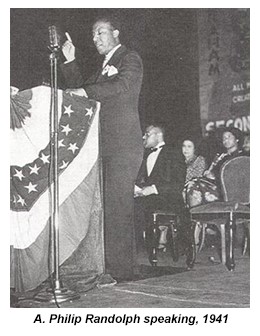 Union and civil rights leader A. Philip Randolph and others meet with President Roosevelt about a proposed July 1 March on Washington to protest discrimination in war industries. A week later, Roosevelt orders that the industries desegregate – 1941
Union and civil rights leader A. Philip Randolph and others meet with President Roosevelt about a proposed July 1 March on Washington to protest discrimination in war industries. A week later, Roosevelt orders that the industries desegregate – 1941
June 19
Eight-hour work day adopted for federal employees – 1912
AFL President Sam Gompers and Secretary of War Newton Baker sign an agreement establishing a three-member board of adjustment to control wages, hours and working conditions for construction workers employed on government projects. The agreement protected union wage and hour standards for the duration of World War I – 1917
 A pioneering sit-down strike is conducted by workers at a General Tire Co. factory in Akron, Ohio. The United Rubber Workers union was founded a year later. The tactic launched a wave of similar efforts in the auto and other industries over the next several years – 1934
A pioneering sit-down strike is conducted by workers at a General Tire Co. factory in Akron, Ohio. The United Rubber Workers union was founded a year later. The tactic launched a wave of similar efforts in the auto and other industries over the next several years – 1934
(In this expanded edition of Strike! you can read about the General Tire Co. strike as well as other labor-management conflicts that have occurred over the past 140 years. Here you’ll learn much about workers’ struggle to win a degree of justice, from the workers’ point of view.)
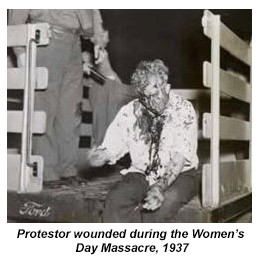 The Women’s Day Massacre in Youngstown, Ohio, when police use tear gas on women and children, including at least one infant in his mother’s arms, during a strike at Republic Steel. One union organizer later recalled, “When I got there I thought the Great War had started over again. Gas was flying all over the place and shots flying and flares going up and it was the first time I had ever seen anything like it in my life…” – 1937
The Women’s Day Massacre in Youngstown, Ohio, when police use tear gas on women and children, including at least one infant in his mother’s arms, during a strike at Republic Steel. One union organizer later recalled, “When I got there I thought the Great War had started over again. Gas was flying all over the place and shots flying and flares going up and it was the first time I had ever seen anything like it in my life…” – 1937
ILWU begins a 4-day general strike in sugar, pineapple, and longshore to protest convictions under the anti-communist Smith Act of seven activists, “the Hawaii Seven.” The convictions were later overturned by a federal appeals court – 1953
June 20
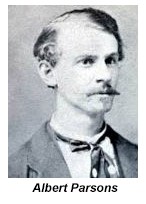 Birth of Albert Parsons, Haymarket martyr – 1848
Birth of Albert Parsons, Haymarket martyr – 1848
The American Railway Union, headed by Eugene Debs, is founded in Chicago. In the Pullman strike a year later, the union was defeated by federal injunctions and troops, and Debs was imprisoned for violating the injunctions – 1893
Henry Ford recognizes the United Auto Workers, signs contract for workers at River Rouge plant – 1941
Striking African-American auto workers are attacked by KKK, National Workers League, and armed White workers at Belle Isle amusement park in Detroit. Two days of riots follow, 34 people are killed, more than 1,300 arrested – 1943
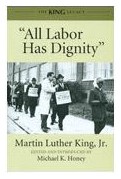 (All Labor Has Dignity: Dr. Martin Luther King was every bit as committed to economic justice as he was to ending racial segregation. He fought throughout his life to connect the labor and civil rights movements, envisioning them as twin pillars for social reform. As we struggle with the growing inequality between the nation’s wealthy and working classes, this collection of King’s speeches on labor rights and economic justice underscore his relevance for today. They help us imagine King anew: as a human rights leader whose commitment to unions and an end to poverty was a crucial part of his civil rights agenda.)
(All Labor Has Dignity: Dr. Martin Luther King was every bit as committed to economic justice as he was to ending racial segregation. He fought throughout his life to connect the labor and civil rights movements, envisioning them as twin pillars for social reform. As we struggle with the growing inequality between the nation’s wealthy and working classes, this collection of King’s speeches on labor rights and economic justice underscore his relevance for today. They help us imagine King anew: as a human rights leader whose commitment to unions and an end to poverty was a crucial part of his civil rights agenda.)
The Taft-Hartley Labor Management Relations Act, curbing strikes, is vetoed by President Harry S. Truman. The veto was overridden three days later by a Republican-controlled Congress – 1947
Oil began traveling through the Alaska pipeline. Seventy thousand people worked on building the pipeline, history’s largest privately-financed construction project – 1977
 Evelyn Dubrow, described by the New York Times as organized labor’s most prominent lobbyist at the time of its greatest power, dies at age 95. The Int’l Ladies’ Garment Workers Union lobbyist once told the Times that “she trudged so many miles around Capitol Hill that she wore out 24 pairs of her size 4 shoes each year.” She retired at age 86 – 2006
Evelyn Dubrow, described by the New York Times as organized labor’s most prominent lobbyist at the time of its greatest power, dies at age 95. The Int’l Ladies’ Garment Workers Union lobbyist once told the Times that “she trudged so many miles around Capitol Hill that she wore out 24 pairs of her size 4 shoes each year.” She retired at age 86 – 2006
June 21
In England, a compassionate parliament declares that children can’t be required to work more than 12 hours a day. And they must have an hour’s instruction in the Christian Religion every Sunday and not be required to sleep more than two in a bed – 1802
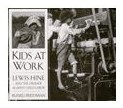 (Kids at Work: Your heart will be broken by this exceptional book’s photographs of children at backbreaking, often life-threatening work, and the accompanying commentary by author Russell Freedman. Photographer Lewis Hine—who himself died in poverty in 1940—did as much, and perhaps more, than any social critic in the early part of the 20th century to expose the abuse of children, as young as three and four, by American capitalism.)
(Kids at Work: Your heart will be broken by this exceptional book’s photographs of children at backbreaking, often life-threatening work, and the accompanying commentary by author Russell Freedman. Photographer Lewis Hine—who himself died in poverty in 1940—did as much, and perhaps more, than any social critic in the early part of the 20th century to expose the abuse of children, as young as three and four, by American capitalism.)
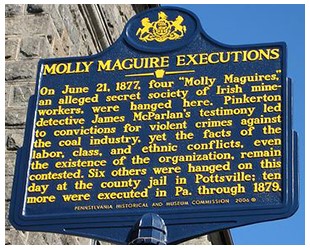
Ten miners accused of being militant “Molly Maguires” are hanged in Pennsylvania. A private corporation initiated the investigation of the 10 through a private detective agency. A private police force arrested them, and private attorneys for the coal companies prosecuted them. “The state provided only the courtroom and the gallows,” a judge said many years later – 1877
The U.S. Supreme Court upholds the right of unions to publish statements urging members to vote for a specific congressional candidate, ruling that such advocacy is not a violation of the Federal Corrupt Practices Act – 1948
An estimated 100,000 unionists and other supporters march in solidarity with striking Detroit News and Detroit Free Press newspaper workers – 1997
June 22
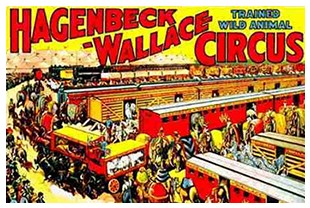 A total of 86 passengers on a train carrying members of the Hagenbeck-Wallace Circus are killed, another 127 injured in a wreck near Hammond, Indiana. Five days later the dead are buried in Woodlawn Cemetery in Forest Park, Ill., in an area set aside as Showmen’s Rest, purchased only a few months earlier by the Showmen’s League of America – 1918
A total of 86 passengers on a train carrying members of the Hagenbeck-Wallace Circus are killed, another 127 injured in a wreck near Hammond, Indiana. Five days later the dead are buried in Woodlawn Cemetery in Forest Park, Ill., in an area set aside as Showmen’s Rest, purchased only a few months earlier by the Showmen’s League of America – 1918
Violence erupted during a coal mine strike at Herrin, Ill. A total of 36 were killed, 21 of them non-union miners – 1922
June 23
 Charles Moyer, president of the Western Federation of Miners, goes to Butte, Mont. in an attempt to mediate a conflict between factions of the miner’s local there. It didn’t go well. Gunfight in the union hall killed one man; Moyer and other union officers left the building, which was then leveled in a dynamite blast – 1914
Charles Moyer, president of the Western Federation of Miners, goes to Butte, Mont. in an attempt to mediate a conflict between factions of the miner’s local there. It didn’t go well. Gunfight in the union hall killed one man; Moyer and other union officers left the building, which was then leveled in a dynamite blast – 1914
Congress overrides President Harry Truman’s veto of the anti-worker Taft-Hartley Act. The law weakened unions and let states exempt themselves from union requirements. Twenty states immediately enacted open shop laws and more followed – 1947
OSHA issues standard on cotton dust to protect 600,000 workers from byssinosis, also known as “brown lung” – 1978
A majority of the 5,000 textile workers at six Fieldcrest Cannon textile plants in Kannapolis, N.C., vote for union representation after an historic 25-year fight – 1999
June 24
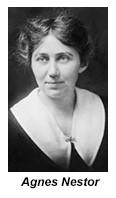 Birth of Agnes Nestor, president of the Int’l Glove Workers Union and longtime leader of the Chicago Women’s Trade Union League. She began work in a glove factory at age 14 – 1880
Birth of Agnes Nestor, president of the Int’l Glove Workers Union and longtime leader of the Chicago Women’s Trade Union League. She began work in a glove factory at age 14 – 1880
Seventeen workers are killed as methane explodes in a water tunnel under construction in Sylmar, Calif. – 1971
– Compiled and edited by David Prosten.
